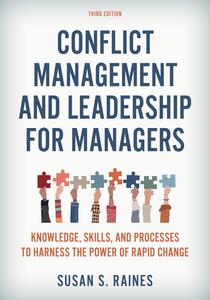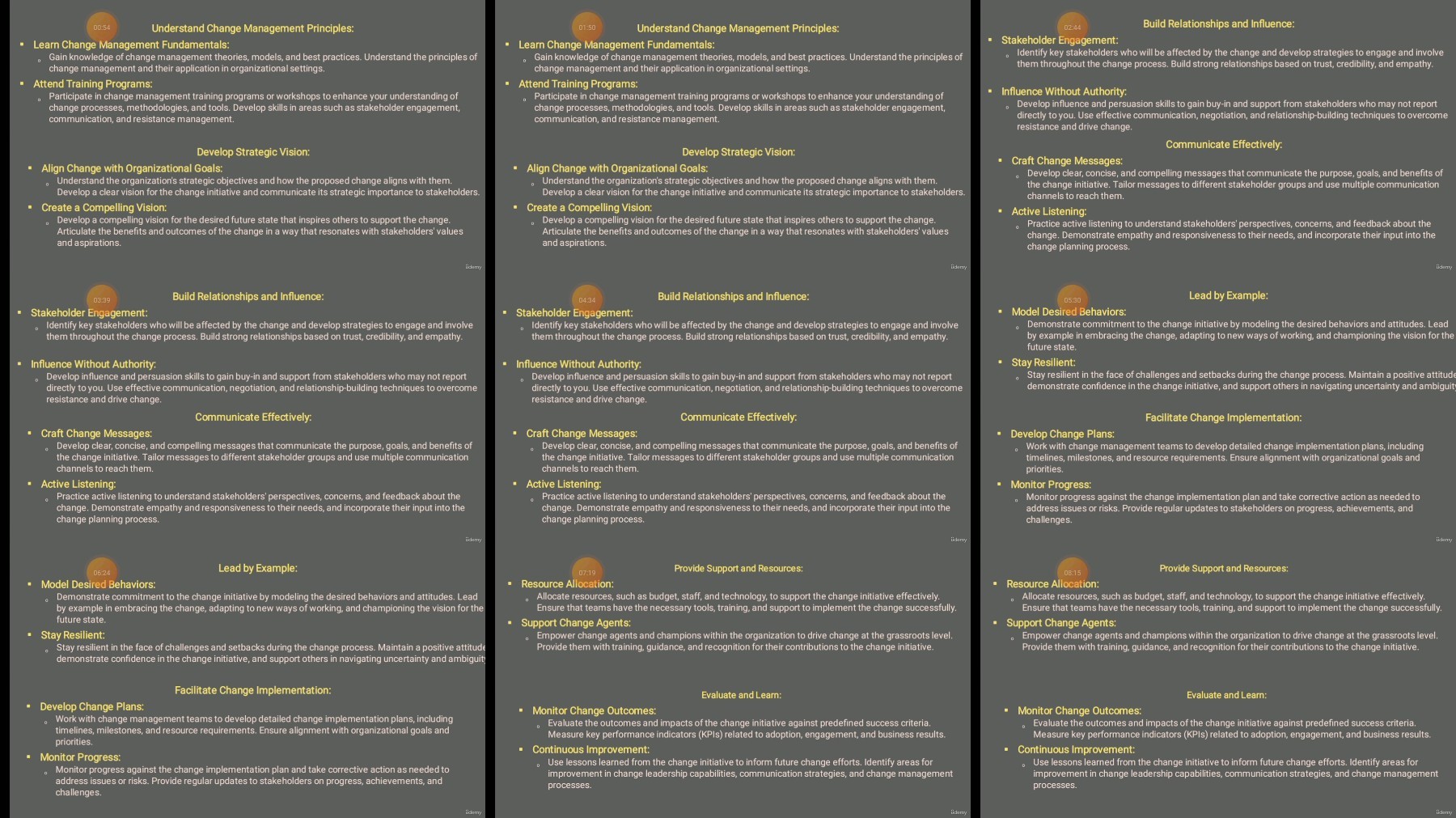Change Management Skills For Managers
Published 5/2024
MP4 | Video: h264, 1920x1080 | Audio: AAC, 44.1 KHz
Language: English
| Size: 1.12 GB[/center]
| Duration: 3h 9m
Master the art of managing change like a pro! Learn the complete process, models and case studies
What you'll learn
Learn the fundamentals of change management and why it is crucial for organizational success.
Create effective change management plans that address challenges and opportunities in an organization.
Execute change initiatives with confidence and overcome obstacles that may arise during the process.
Assess the impact of change management strategies and adjust plans for continuous improvement.
Apply the skills learned to real-life scenarios through case studies and interactive exercises.
Enhance your management skill for better team management, situation handling and task management.
Enhance your efficiency as a manager by showing your competency and excellence as a supervisor
Manage and create an impact about your capability as a leader to establish your importance in the organisation.
Prepare yourself to manage your team more effectively and making them more aligned plus productive.
Requirements
Basic understanding of corporate
Basic understanding or aspiration to know management skill
Description
Change Management is the discipline of managing change within an organization to ensure successful adoption of new processes, technologies, or organizational structures. This course covers the principles, strategies, and techniques used to navigate and lead change in a dynamic business environment.In today's fast-paced and dynamic business environment, the ability to effectively manage change is essential for organizational success. As a manager, you play a pivotal role in leading your team through transitions, whether they involve process improvements, organizational restructuring, or technology implementations.In this course, you will develop the skills and strategies necessary to navigate change successfully and ensure smooth transitions for your team. Here's an overview of what you can expect to learn:1. Understanding Change: Gain a deep understanding of the nature of change and its impact on individuals, teams, and organizations. Explore different types of change, such as incremental changes and transformative initiatives, and the reasons behind resistance to change.2. Change Management Frameworks: Familiarize yourself with popular change management frameworks and methodologies, such as Kotter's 8-Step Process, ADKAR model, and Lewin's Change Management Model. Learn how to apply these frameworks to plan, execute, and sustain change initiatives effectively.3. Communication and Engagement: Develop effective communication strategies to keep your team informed and engaged throughout the change process. Learn how to craft compelling messages, address concerns, and solicit feedback from stakeholders to foster buy-in and commitment.4. Stakeholder Management: Identify key stakeholders who will be affected by the change and develop tailored strategies to manage their expectations and concerns. Learn how to build alliances, address resistance, and leverage influential stakeholders to champion the change.5. Leadership and Resilience: Enhance your leadership skills to inspire and motivate your team during times of change. Learn how to lead by example, demonstrate resilience, and provide support to team members as they navigate uncertainty and ambiguity.6. Managing Resistance: Understand the reasons behind resistance to change and learn how to effectively manage resistance within your team. Explore strategies for addressing common sources of resistance, building trust, and creating a supportive environment for change.7. Monitoring and Evaluation: Implement mechanisms to monitor the progress of change initiatives and evaluate their effectiveness. Learn how to identify early warning signs, adjust strategies as needed, and celebrate successes along the way.8. Change Leadership in Practice: Apply your newfound knowledge and skills to real-world change scenarios through case studies, simulations, and role-playing exercises. Practice leading change initiatives and receive feedback from experienced facilitators to enhance your capabilities.Key Highlights

ractical strategies for managing organizational changeEffective communication techniques for change initiativesTools for overcoming resistance to changeCase studies on successful change management implementationsCurriculumModule 1: Introduction to Change Management1.1: Key Roles in Change ManagementModule 2: Theoretical Foundations of Change Management2.1: Lewin's Change Management Model2.2: ADKAR Model2.3: Kotter's 8-Step Change Model2.4: McKinsey 7-S Framework2.5: Prosci's Change Management Process2.6: Kübler-Ross Change Curve2.7: Bridges' Transition Model2.8: The Kotter and Schlesinger Model of Change2.9: Cognitive Dissonance Theory2.10: Transtheoretical Model (Stages of Change)2.11: Social Cognitive Theory2.12: Theory of Planned Behavior2.13: Self-Determination Theory2.14: Dual-Process Models of Change2.15: Attribution Theory2.16: The Health Belief ModelModule 3: Change Readiness AssessmentModule 4: Developing a Change Management StrategyModule 5: Building Change Leadership Capabilities5.1: Foster Change Leadership Mindset5.2: Provide Ongoing Support and Resources5.3: Evaluate and AdjustModule 6: Communication and Change MessagingModule 7: Change Implementation PlanningModule 8: Change Management Tools and Techniques8.1: Change management software and technologyModule 9: Managing People Through ChangeModule 10: Sustaining Change and Continuous ImprovementModule 11: Leading Change in Complex Environments11.1: Global Stakeholder Engagement11.2: Cross-Cultural Leadership11.3: Change Implementation and Execution11.4: Performance Measurement and Feedback11.5: Managing change in virtual teams11.6: Fostering Open Communication11.7: Building Trust and Engagement11.8: Adapting Leadership Style11.9: Managing Resistance and Overcoming Challenges11.10: Agile Change Management Principles11.11: Agile Change Management Strategies11.12: Agile Change Management Techniques11.13: Agile Change Leadership11.14: Agile Change GovernanceModule 12: Case Studies and Best Practices in Change Management12.1: Learning from change management12.2: Change Leadership
Overview
Section 1: Module 1: Introduction to Change Management
Lecture 1 Introduction to Change Management
Lecture 2 Key Roles in Change Management
Section 2: Module 2: Theoretical Foundations of Change Management
Lecture 3 Theoretical Foundations of Change Management
Lecture 4 Lewin's Change Management Model
Lecture 5 ADKAR Model
Lecture 6 Kotter's 8-Step Change Model
Lecture 7 McKinsey 7-S Framework
Lecture 8 Prosci's Change Management Process
Lecture 9 Kübler-Ross Change Curve
Lecture 10 Bridges' Transition Model
Lecture 11 The Kotter and Schlesinger Model of Change
Lecture 12 Cognitive Dissonance Theory
Lecture 13 Transtheoretical Model (Stages of Change)
Lecture 14 Social Cognitive Theory
Lecture 15 Theory of Planned Behavior
Lecture 16 Self-Determination Theory
Lecture 17 Dual-Process Models of Change
Lecture 18 Attribution Theory
Lecture 19 The Health Belief Model
Section 3: Module 3: Change Readiness Assessment
Lecture 20 Change Readiness Assessment
Section 4: Module 4: Developing a Change Management Strategy
Lecture 21 Developing a Change Management Strategy
Section 5: Module 5: Building Change Leadership Capabilities
Lecture 22 Building Change Leadership Capabilities
Lecture 23 Foster Change Leadership Mindset
Lecture 24 Provide Ongoing Support and Resources
Lecture 25 Evaluate and Adjust
Section 6: Module 6: Communication and Change Messaging
Lecture 26 Communication and Change Messaging
Section 7: Module 7: Change Implementation Planning
Lecture 27 Change Implementation Planning
Section 8: Module 8: Change Management Tools and Techniques
Lecture 28 Change Management Tools and Techniques
Lecture 29 Change management software and technology
Section 9: Module 9: Managing People Through Change
Lecture 30 Managing People Through Change
Section 10: Module 10: Sustaining Change and Continuous Improvement
Lecture 31 Sustaining Change and Continuous Improvement
Section 11: Module 11: Leading Change in Complex Environments
Lecture 32 Leading Change in Complex Environments
Lecture 33 Global Stakeholder Engagement
Lecture 34 Cross-Cultural Leadership
Lecture 35 Change Implementation and Execution
Lecture 36 Performance Measurement and Feedback
Lecture 37 Managing change in virtual teams
Lecture 38 Fostering Open Communication
Lecture 39 Building Trust and Engagement
Lecture 40 Adapting Leadership Style
Lecture 41 Managing Resistance and Overcoming Challenges
Lecture 42 Agile Change Management Principles
Lecture 43 Agile Change Management Techniques
Lecture 44 Agile Change Leadership
Lecture 45 Agile Change Governance
Section 12: Module 12: Case Studies and Best Practices in Change Management
Lecture 46 Case Studies and Best Practices in Change Management
Lecture 47 Learning from change management
Lecture 48 Agile Change Management Strategies
Lecture 49 Change Leadership
Lecture 50 Change management process
Lecture 51 Change management Case Studies
Lecture 52 Change management story
Lecture 53 Change management templates
Anyone wants to learn effective management or managerial skill for corporate,Any manager or management professional want to improve efficiency
Free search engine download: Change Management Skills for Managers










